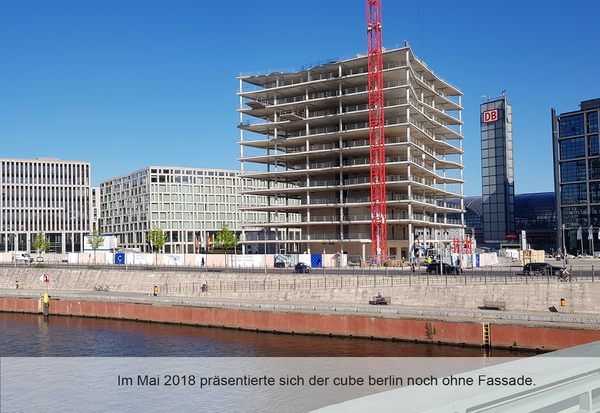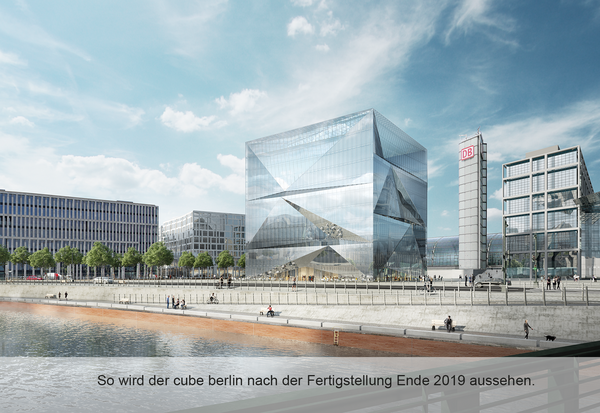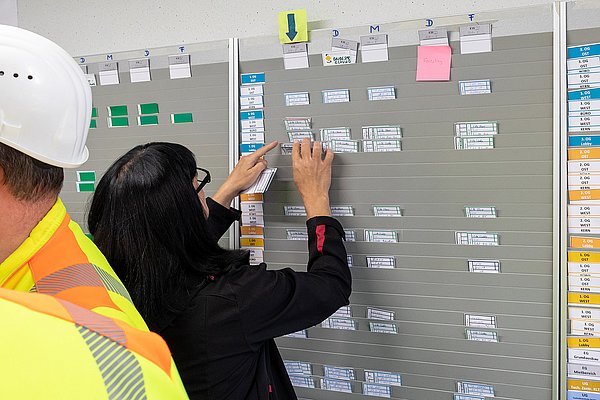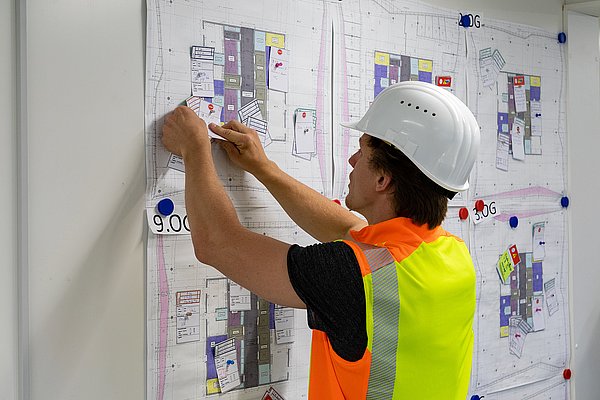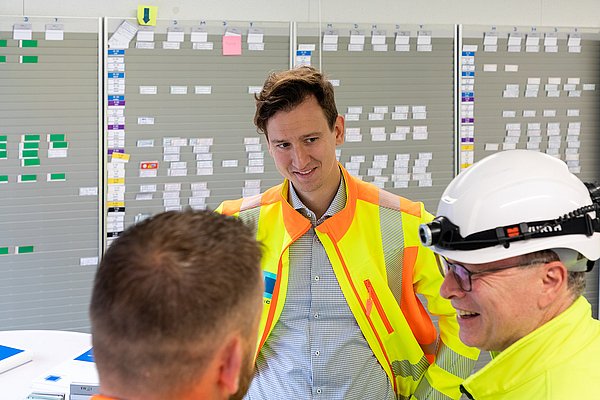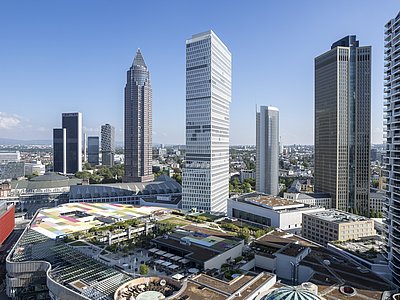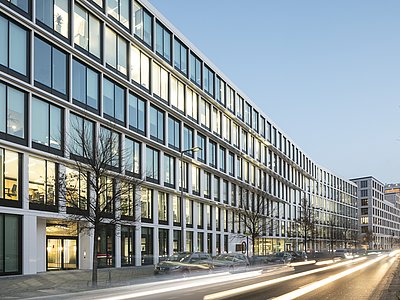cube berlin - "Europes smartest building"
Berlin, Washingtonplatz, 8:30 am: In the container office at the cube berlin construction site, all the project participants gather for their daily meeting. They quickly clarify the most important questions: Which trades will carry out their work today? Has all the necessary preparatory work been completed? When will the right material be delivered? The processes run so smoothly thanks to an innovative method, lean construction management, which is being used here by the CA Immo building subsidiary omniCon for the first time. This makes the construction site a kind of pilot project for effective, transparent and stress-free construction. Thanks to consistent digitalisation and the use of artificial intelligence, ‘Europe’s smartest building’, as Berlin’s largest daily newspaper recently headlined, is set to be completed here by the end of the year.
In lean construction management, the principles of lean management or lean production have been transferred from car production to the construction sector. Toyota introduced the essential principles as early as the mid-20th century with the aim of increasing efficiency and quality in production beyond technical automation. Lean construction management is now based on the realisation that mistakes can be avoided, above all, through transparent and standardised processes. In order to handle the processes optimally, communication and cooperation are crucial requirements. The trades concerned are therefore involved early in the planning of the construction processes. The focus is on the question: what has to be done by what time? Because in contrast to the conventional planning method, here, the project participants plan from back to front, i.e. from the result to the beginning and not from the beginning to the result. To meet deadlines and, for example, avoid costly repetitive errors, there is a well thought-out day-by-day project schedule. What’s special about this process plan is that it is not a rigid framework, but something that is put to the test weekly, adapted and continuously updated by the participants. The work is done with the Last Planner system, a collaborative control tool that classifies the individual steps as ‘should/can/will be done’, and ensures that the processes are considered in detail and remain free of obstacles.
The plug-in card system is suitable for daily planning at the construction site. This is a board that serves to visualise the state of the project. ‘The visual presentation is simply magnificent,’ says omniCon Project Manager Wilko Eichholz. Coloured cards symbolise the tasks of the individual trades in the coming four weeks. The subcontractor, in consultation with other trades that it depends on, determines during process planning when it can complete its tasks, and then plugs the corresponding cards into the board. ‘That makes sense. After all, they’re the one who comes to the construction site with their tool kit and has to take responsibility for the timeliness of their work,’ says Sebastian Eckernkamp, Managing Director at omniCon.
Wilko Eichholz sees in the new way of working clear differences from before. ‘Back then, the project manager sat in a quiet little room and created the scheduling in MS Project, sent it off to everyone else, and then they started to build – the communication and coordination of processes was much too short. Today we start at the end of the process – the completion of the property. In doing so, we act in a cooperative partnership. We don’t dictate anything to the companies; we only make suggestions. This ‘forces’ our colleagues to deal with the processes in advance. It requires the responsibility of each individual. After all, several trades are working at the same time each week, so it’s very important that they organise and coordinate themselves.’
Eichholz introduced lean construction management at the cube berlin construction site together with Construction Manager Oleg Weinbender – with the aim of implementing it at other omniCon construction sites as well. They were assisted by the consulting firm Drees & Sommer. As part of his diploma thesis, Weinbender had already analysed the problems of classical scheduling and pointed out possible solutions. ‘It's about the question of how cost, quality and efficiency objectives can be achieved even better,’ says Weinbender. This includes faster processes, greater stability and less waste at the construction site. ‘We’ve been dealing with this topic at omniCon for some time,’ says Sebastian Eckernkamp. ‘Even though maintaining quality, deadlines and budgets has one of our priorities for years. But there is always room for improvement.’
In order to be able to identify and remedy possible errors at an early stage, lean construction management breaks complex projects down into small parts, so-called individual and equal areas. Equal areas are areas that are often repeated, such as sanitary facilities, rental areas, staircases or kitchenettes. Eckernkamp gives an example: ‘In a 50-storey tower, I can install the connections for three kitchenettes on each floor. Afterwards, the kitchen builder may find that the water connections aren’t suitable for the kitchens at all. To prevent that, the trades concerned get together early in lean construction management. Then we build a fully complete kitchen with all the trimmings. If everything is right, the kitchens will be implemented serially according to the same procedure on all floors. That way we can react much faster to problems, not just when it’s too late.’
For Wilko Eichholz and his colleagues, lean construction management is a success: ‘We hardly have any breakdowns or downtime during construction at cube berlin. We are definitely meeting our deadlines, and our quality standards too. The processes are better structured, and we have also received feedback to confirm this,’ he emphasises. It saves time too: the classic site meetings now take a maximum of an hour, because everything that has to do with production processes is outsourced to the LCM meetings.
For Sebastian Eckernkamp, the cooperation of the trades is a decisive factor for success: ‘Our ambition is to have the construction site orderly and clean. This is particularly important for the individual trades. Because the companies want to finish their work as quickly as possible and without any obstacles.’ The best praise last year came from a satisfied subcontractor: they said, you have a well-functioning and optimally planned construction site; not a bad place to work. ‘Of course we were very pleased about that. We know other major projects – especially in Berlin – where the principle of chaos prevails. This distinguishes us and CA Immo clearly from our competitors and represents an advantage for subcontractors that should not be underestimated. While they sometimes have to wait for hours at other construction sites until they can do their job, with us, they can already be finished and move on to other construction sites.’
omniCon uses this innovative method not only at cube berlin, but also in other projects such as the Munich MY.O and the ONE hotel and office tower in Frankfurt. The innovation processes are never completed. On the contrary: ‘We are constantly optimising,’ says Oleg Weinbender. Lean management can also be applied earlier, in the planning phase, as lean design management. But that remains a project for the future. Planning processes are highly complex.

